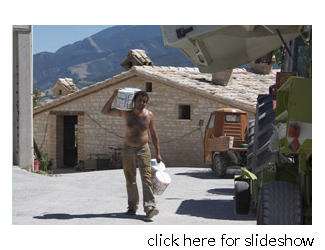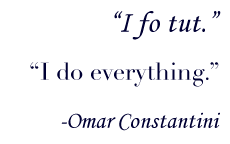Omar Constantini: I Do Everything
by Chris Roark
“I fo tut.” “I do everything.”
When Omar Constantini, 34, makes this statement, he’s not saying this to boast; he says it because it is true. As a third generation family farmer, Omar awakens each and every day with a large variety of responsibilities he shares with his father Guerrinio, brother Dennis, and uncles, Antonio and Giuseppe. His passion is hunting wild game – his life is farming.
 The sprawling family farm, several kilometers outside of Cagli, sits atop a dry, rocky hill surrounded by fig trees and a variety of rugged wood and stone structures, each serving any number of important functions. One structure serves as the hay bailer garage. Next to it is the welding and machine shop where small piles of broken tractor parts lay in the dirt. Tools are everywhere. A few meters down the hill a long rectangular granaio houses a number of cows and horses. As the animals pick through the hay Omar spread earlier in the day, a hen and her hatchlings migrate in and out of the dusty sunbeams streaming through open windows.
The sprawling family farm, several kilometers outside of Cagli, sits atop a dry, rocky hill surrounded by fig trees and a variety of rugged wood and stone structures, each serving any number of important functions. One structure serves as the hay bailer garage. Next to it is the welding and machine shop where small piles of broken tractor parts lay in the dirt. Tools are everywhere. A few meters down the hill a long rectangular granaio houses a number of cows and horses. As the animals pick through the hay Omar spread earlier in the day, a hen and her hatchlings migrate in and out of the dusty sunbeams streaming through open windows.
Animals are everywhere. Goats, pigs, wild turkeys, geese, chickens, and of course cows and horses, are contained in a number of sizable pens around the family home. The majority of the cattle are in a huge field just down the hill from the collection of buildings. Each and every animal will help feed the large family caring for them at Constantini Farm, or be slaughtered, processed and sold at Antonio’s azienda agricola e macelleria in Acqualagna.
Beyond the buildings and holding pens are golden fields stretching out in every direction. The majority of the fields are for growing hay. The green patches woven in between are grains grown to supplement the hay and feed the poultry. The men spend much of their time operating, maintaining and repairing the harvesting machinery since these are a critical link to how the animals are fed. Without hay and grain, there are no animals. Without animals there is no Constantini Farm.
Omar readies the tractor and hay baler for a winding, dusty trip to one of the smaller, hilly hay fields a couple of kilometers from the house. As he weaves the baling twine on the hay baler spindles, there is no smile, no frown - just simple concentration in his eyes. When Omar starts the tractor, a problem appears with the cab ventilation system - he will need this because of the heat and dust. Omar pulls an electrical panel from inside the cab to see if he can identify the problem. Eventually, Antonio opens the engine cover and adjusts a compressor belt; Omar starts the engine and all is well.
The tractor’s diesel exhaust begins mixing with another, more pungent odor wafting up the hillside. Omar’s father, Guerrinio, is spraying sulphur on a small hillside vineyard just beyond the turkey pen. These grapes are harvested, crushed, and bottled by Omar’s dad and uncles. They are purely for family pleasure. Within moments, Guerrino’s tractor grinds to a halt; a sheared half-shaft is  identified as the culprit. In less than twenty minutes, the half shaft is cleaned, welded, and reinstalled. One less tractor part will added to the abandoned parts in lying in the dirt on the machine shop floor.
identified as the culprit. In less than twenty minutes, the half shaft is cleaned, welded, and reinstalled. One less tractor part will added to the abandoned parts in lying in the dirt on the machine shop floor.
Most of hay has already been cut and raked for this years harvest. Normally there are two cuttings per year, but due to a lack of rain, there will only be one. With the hay mechanically raked into winding rows, Omar simply needs to drive the baler over each row. After a few hundred meters, Omar stops the tractor – the baler loudly belching out dust and hay shards as it wraps the twine around the bale. A moment later a giant wheel of hay roles out of the rear of the baler like a massive egg being deposited by some kind of alien from another world. Omar activates a switch to close the baler and keeps moving down the raked row, the tractor and baler framing dozens of distant bales Omar did the week before.
Over the next 30 or 40 years, Omar will create thousands of bales like this. Tractors and harvesters will break and be repaired. Baby animals will be born, fed, fattened up and sold at the proper tonnage…
Eventually, a 4th generation Constantini will say, “I fo tut.”
Adventure with Us!








